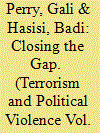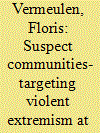|
|
|
Sort Order |
|
|
|
Items / Page
|
|
|
|
|
|
|
| Srl | Item |
| 1 |
ID:
175714


|
|
|
|
|
| Summary/Abstract |
In the aftermath of 9/11, aviation security has become a central component of counterterrorism. To mitigate threats whilst maintaining flight schedules, airport security officers require the cooperation of all passengers, but especially of ethnic minorities perceived as posing a potential threat to homeland security, often referred to as “suspect communities.” Passengers from suspect communities are subject to rigorous screening, but are also regarded as a source of information, making their cooperation even more important than that of other passengers. Nevertheless, suspect communities’ cooperation with airport security, and the gap between their attitudes and those of other passengers, have not yet been examined. The current study utilizes a survey of 1970 passengers at the Ben-Gurion airport in Israel, examining passengers’ perceptions of airport security and their willingness to cooperate. We find that passengers belonging to the suspect community of Israeli Muslims were less willing to cooperate with security procedures than all other passengers. However, when controlling for passengers’ perceptions of legitimacy and procedural justice, Israeli Muslims were more willing to cooperate with airport security than Israeli Jews. The findings highlight the importance of legitimacy and procedural justice perceptions in obtaining the cooperation of suspect communities, and suggest practical pathways for improving cooperation.
|
|
|
|
|
|
|
|
|
|
|
|
|
|
|
|
| 2 |
ID:
132294


|
|
|
|
|
| Publication |
2014.
|
| Summary/Abstract |
Throughout Europe, authorities have set up new policy measures and programs to curb homegrown violent extremists. This article describes local policy responses to violent Islamic extremism-and/or the mere threat of it-in the neighborhoods Oost in Amsterdam, Moabit and Soldiner Kiez in Berlin, and Tower Hamlets in London. Based on locally conducted fieldwork, the study compares and contrasts these neighborhoods' approaches and aims to make a first assessment of their effects. A major finding for all three cities is that authorities target the entire local Muslim community rather than a few select individuals. This can lead to the construction of suspect communities, an approach with possible paradoxical effects on targeting actual violent extremists. Suspect communities subsequently create stigmatization, exclusion, and possibly marginalization, which not only has negative consequences for involved groups, but may well produce a breeding ground for future violence. However, the author did not find that engagement with Islamic organizations or individuals was used to directly change the nature of local Muslim communities. Orthodox and non-violent extremist organizations and individuals in all three cities were potential partners for engagement, which probably lowers the chance of stigmatizing the suspect communities.
|
|
|
|
|
|
|
|
|
|
|
|
|
|
|
|
|
|
|
|
|